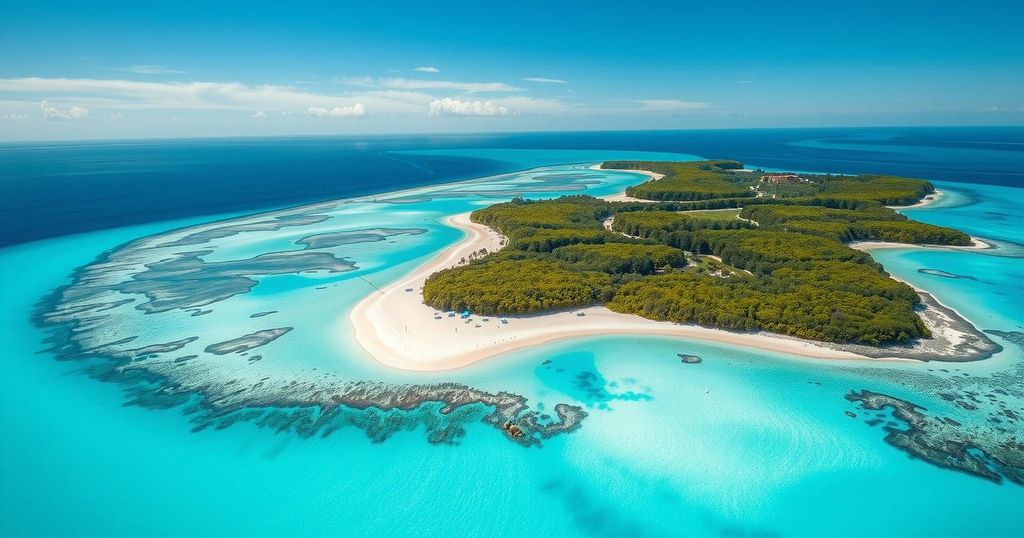Global news
AFRICA, BERN, BERT, BRAZIL, BRITAIN, CHAGOS ISLANDS, COURT, DIEGO GARCIA, DIEGO ISLAND, DONALD TRUMP, EUROPE, HIGH COURT, IMMIGRATION, INTERNATIONAL RELATIONS, LABOUR, LONDON, MARCO RUBIO, MAURITI, MAURITIUS, MIGRATION, NAVIN RAMGOOLAM, NORTH AMERICA, PACIFIC, SOUTH AMERICA, U. S, UK, UNITED KINGDOM, UNITED STATES, US, WASHINGTON
Marcus Li
0 Comments
U.S. Supports UK-Mauritius Agreement on Chagos Islands Amid Controversy
The U.S. welcomes the UK-Mauritius agreement to return the Chagos Islands, pivotal for a military base. Mauritius’ Prime Minister hails it as a victory for decolonization. However, legal disputes surface as Chagossian voices seek recognition of their rights amid the deal’s implications.
The United States expressed approval on Thursday regarding the British government’s decision to negotiate the return of the Chagos Islands to Mauritius. In exchange for this, the UK will retain access to a crucial military base used jointly with American forces. Secretary of State Marco Rubio commented that this historic agreement supports the sustained functionality of the Diego Garcia military facility, deeming it essential for both regional and global security.
Mauritius has celebrated the agreement as a long-awaited triumph. Prime Minister Navin Ramgoolam characterized the deal as a “great victory”, stating it completes the decolonization process of Mauritius that commenced in 1968. The sentiment among many Mauritians resonates with the overarching significance of reclaiming the islands as a matter of national pride and identity.
Earlier on the same day, British Prime Minister Keir Starmer finalized the agreement to return the remote archipelago—home to the strategically important Diego Garcia base—after a lengthy judicial process. Starmer noted that this was the only feasible solution to ensure military access to the base, which notably serves American interests in the region. Under the agreement, Britain will compensate Mauritius £101 million ($136 million) annually for a lease spanning 99 years.
The Prime Minister underscored the necessity of this deal for Britain’s national interest, stressing that failing to act would hinder the country’s obligations to its allies, which include the United States. However, some contentious legal matters clouded the formal signing of the agreement, as a court ruling just prior delayed it temporarily when two Chagossian women sought an injunction against the announcement.
After an urgent morning hearing, Judge Martin Chamberlain lifted the injunction, allowing the agreement to move forward. Yet, it was amid growing concerns regarding the historical and ongoing rights of Chagossian islanders, many of whom were forcibly removed from their homeland to facilitate the military base’s establishment decades ago.
Many islanders, particularly Bertrice Pompe, spoke up against the agreement, articulating that they did not wish to relinquish their rights to the Mauritian government. Pompe expressed that it marks a “very, very sad day” and reaffirmed their distinct identity as Chagossians separate from Mauritians.
The historical backdrop is complex, as Britain separated the Chagos Islands from Mauritius over fifty years ago, leading to the eviction of around 2,000 inhabitants. As a result of ongoing international disputes about these islands, a 2019 UN ruling determined that Britain should return them to Mauritius. Despite the UN’s stance, the UK continued to maintain control over the islands to support its military operations.
This turn of events signifies a potential change in a longstanding issue related to colonial practices. The strategic base on Diego Garcia has been instrumental in U.S. military operations for decades. As the story unfolds, the struggle of the Chagossian people continues to persist, juxtaposed with national interests and international relations.
While there are legal and diplomatic complexities surrounding the situation, the recent developments indicate both potential resolutions and ongoing tensions regarding sovereignty and rights.
The fate of the Chagos Islands remains a contentious subject, as international bodies continue to urge Britain to adhere to legal and moral obligations toward the residents. Diplomatic negotiations and legacy issues surrounding colonialism will surely continue to shape the discourse moving forward.
In conclusion, the recent agreement between the UK and Mauritius on the Chagos Islands marks a significant development in a long-standing territorial dispute. While the U.S. and British governments tout this agreement as a strategic achievement, it simultaneously raises concerns regarding the rights of the displaced Chagossian population. This situation illustrates the delicate interplay of national interests, colonial histories, and the ongoing struggle for justice and recognition among the Chagossians. The global community’s response and the path forward remain to be seen as legal and diplomatic frameworks develop.
Original Source: www.eurasiantimes.com




Post Comment